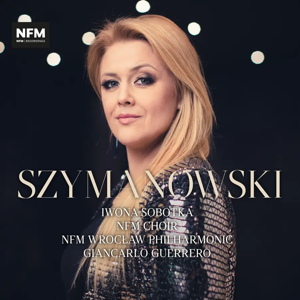
Karol Szymanowski (1882-1937)
Concert Overture, Op 12 (1904-1905)
Songs of a Fairy Princess, Op 31 (1915, orch. composer 1933 and Bruno Dozza, 2011-2012)
Symphony No 3 for soprano, chorus and orchestra ‘The Song of the Night’, Op 27 (1914-1916)
Iwona Sobotka (soprano), NFM Choir, NFM Wroclaw Philharmonic/Giancarlo Guerrero
rec. 2021/2022, Main Hall, National Forum of Music, Wrocław, Poland
Polish texts and English translation included
CD Accord ACD315 [56]
In recent years Szymanowski has been well recorded, and many people have come to love, in particular, the lyrical lines, the impressionist colours and gorgeous scoring of the works of his middle period, such as the first Violin Concerto and the opera King Roger. Here we have two of the works from this period but in versions which will be unfamiliar to most listeners.
Szymanowski originally wrote his Songs of a Fairy Princess as a set of six for voice and piano, to words by his sister Zofia in 1915. The vocal line was written for their sister Stanislawa, a coloratura soprano. In 1933 the composer orchestrated three of the songs for a chamber-size orchestra, and recordings of the orchestral version have hitherto featured just these three. These include one by the singer here, Iwona Sobotka, with Rattle on one of his valuable Szymanowski discs; she has also recorded the voice and piano version. However, some years ago she persuaded the composer Bruno Dozza to orchestrate the remaining three, and so what we have here is the full set of six in orchestral garb, of which this is the first recording. (There is also another orchestration, by Sakari Oramo, but I have not heard this and do not think it has yet been recorded.) They sound quite ravishing; for those who do not know them, think of Ravel’s Sheherazade songs.
Szymanowski’s third symphony is a one movement choral work with a text by Jalāl al-Dīn Rūmī, in a Polish translation by Tadeusz Miciński, extolling the beauty of the Persian night. The idiom owes something to Scriabin’s Poem of Ecstasy and Prometheus, for example in the calls to attention on the brass, and also to Ravel’s Daphnis and Chloe, for example in the multiply divided strings with occasional solo violin, also at times the chorus is wordless, but these influences have been thoroughly assimilated and the work, from its haunting opening to its huge climaxes, is one to leave one spell-bound. There is a solo part, for which Szymanowski specified a tenor, and this is how it is usually performed. However, he allowed the alternative of a soprano, on at least one occasion with his sister Stanislawa, and that is what we have here. Actually, this is how I first heard the work, with Stefania Woytowicz as the soloist. I do not think that it is simply because of this that I prefer to hear it with a soprano, with Iwona Sobotka soaring above the orchestra.
To complete, or rather begin, the disc we have the Concert Overture. This is an early work, when Szymanowski was still very much under the influence of Richard Strauss. Indeed, the work is so Straussian as to amount to pastiche, except that his themes are not as memorable as those of Strauss. I do not find it very interesting – why listen to a pastiche when you can have the original? – but it is apparently popular in Poland and Szymanowski completists, at least, will be glad to have it.
Giancarlo Guerrero has been conducting the NFM Wroclaw Philharmonic for some years and they work well together, realizing Szymanowski’s intricate textures and shimmering colours well. The choir sing with a will and Sobotka is a leading Szymanowski soprano of our time. The recording is fine and there are good notes, texts and translations. Even those who have other recordings of the songs and the symphony should hear this.
Stephen Barber
Buying this recording via a link below generates revenue for MWI, which helps the site remain free.



















